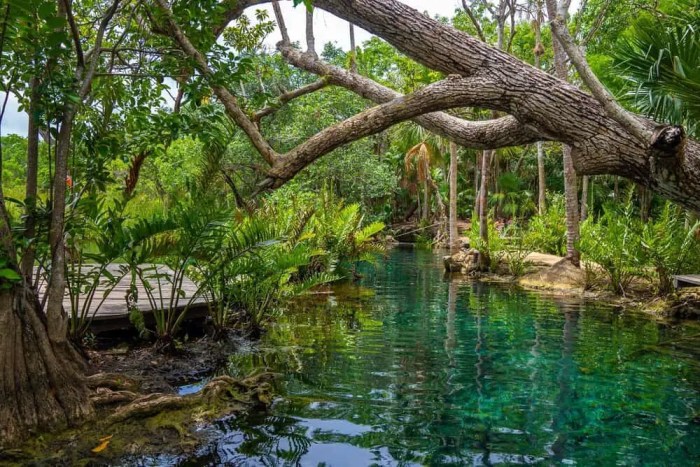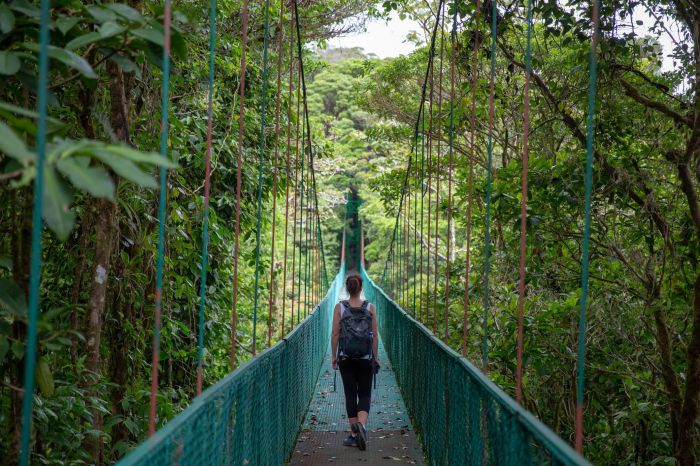As sustainable travel destinations take center stage, this article delves into the world of responsible tourism, exploring destinations that prioritize environmental conservation, offer eco-friendly transportation options, and promote cultural heritage while supporting local communities.
From destinations with strict environmental regulations to those with a range of sustainable transportation options, this article provides a comprehensive overview of the key aspects of sustainable travel.
Destinations Prioritizing Environmental Conservation

Destinations worldwide are increasingly prioritizing environmental conservation to protect their natural resources and ecosystems. They are implementing strict environmental regulations, promoting sustainable practices, and collaborating with local communities to preserve biodiversity and mitigate the impact of tourism.
Sustainable travel destinations are becoming increasingly popular, as travelers seek to minimize their environmental impact while exploring new places. For those looking for a luxurious experience, there are many luxury travel deals available that offer eco-friendly accommodations, dining options, and activities.
From eco-lodges in the rainforest to carbon-neutral resorts on the beach, there are plenty of ways to travel in style while also supporting sustainable tourism.
Here are some notable examples of destinations that have made significant strides in environmental conservation:
Costa Rica
- Costa Rica has been a pioneer in sustainable tourism, with over 25% of its land area protected as national parks and reserves.
- The country has implemented strict environmental regulations, including a ban on single-use plastics and a commitment to renewable energy.
- Costa Rica’s conservation efforts have resulted in the preservation of its rainforests, which are home to a diverse range of flora and fauna.
Galapagos Islands, Ecuador
- The Galapagos Islands are a UNESCO World Heritage Site and one of the most unique and fragile ecosystems on Earth.
- The Ecuadorian government has implemented strict regulations to protect the islands’ unique wildlife, including restrictions on tourism and fishing.
- As a result, the Galapagos Islands have been preserved as a pristine natural habitat for species such as giant tortoises, marine iguanas, and sea lions.
Bhutan
- Bhutan has a unique Gross National Happiness index that measures the well-being of its citizens, including environmental sustainability.
- The country has a constitutional mandate to maintain 60% of its land area under forest cover.
- Bhutan’s conservation efforts have resulted in the protection of its pristine forests, which are home to endangered species such as the snow leopard and the red panda.
Sustainable Transportation Options

Adopting sustainable transportation methods while traveling not only reduces our carbon footprint but also enhances our travel experiences by connecting us with local communities and offering unique perspectives on destinations. Many cities and regions worldwide are prioritizing eco-friendly transportation options, making it easier for travelers to explore responsibly.
Public Transportation
Efficient and affordable public transportation systems, including buses, trains, and subways, are widely available in major cities. Utilizing public transport reduces traffic congestion, air pollution, and greenhouse gas emissions. Moreover, it provides an immersive way to interact with locals and experience the daily life of the destination.
Cycling
Cycling is an excellent way to explore destinations at a leisurely pace while enjoying the fresh air and local scenery. Many cities offer bike-sharing programs and designated bike lanes, making it convenient and safe for cyclists. Cycling not only promotes physical activity but also reduces air pollution and traffic noise.
Electric Vehicles
Electric vehicles (EVs) are becoming increasingly popular as a sustainable transportation option. Renting or using ride-sharing services with EVs significantly reduces carbon emissions compared to gasoline-powered vehicles. Additionally, many destinations offer charging stations, making it easy to power up EVs during your travels.
Tips for Minimizing Environmental Impact
* Plan your itinerary to minimize the need for long-distance transportation.
* Choose accommodations near public transportation hubs or in walkable areas.
* Opt for walking or cycling for short distances whenever possible.
* Utilize public transportation, ride-sharing services, or rent an electric vehicle for longer distances.
* Pack light to reduce the carbon footprint associated with luggage transportation.
Responsible Accommodation and Dining

When choosing a travel destination, consider the environmental impact of your accommodation and dining choices. Look for hotels and guesthouses that prioritize sustainability, from energy-efficient lighting to water-saving fixtures. Support local businesses that use organic, locally sourced ingredients and minimize waste.
Sustainable Accommodation Practices
- Energy efficiency: LED lighting, motion-activated sensors, solar panels
- Water conservation: Low-flow toilets, rainwater harvesting systems
- Waste reduction: Composting, recycling programs, reusable amenities
- Eco-friendly building materials: Recycled materials, natural insulation
- Green certifications: LEED, Green Key, EarthCheck
Supporting Local Businesses
By supporting local businesses, you not only contribute to the local economy but also reduce your environmental footprint. These businesses often source ingredients from nearby farms, reducing transportation emissions. They also support sustainable practices, such as organic farming and fair trade.
Sustainable Restaurants and Cafes, Sustainable travel destinations
- Organic and locally sourced ingredients: Supports local farmers and reduces food miles
- Ethically produced food: Ensures animal welfare and fair labor practices
- Plant-based options: Reduces meat consumption and its environmental impact
- Compostable or reusable packaging: Minimizes waste
- Zero-waste initiatives: Donates surplus food to charities or uses it for composting
Cultural Heritage and Local Communities
Sustainable tourism involves respecting and preserving the cultural heritage and traditions of local communities. Destinations that actively engage with local communities and promote cultural heritage offer travelers a unique and enriching experience while supporting the preservation of traditional practices, crafts, and arts.
Benefits of Tourism that Supports Traditional Practices, Crafts, and Arts
- Preserves cultural heritage and traditions
- Provides economic opportunities for local communities
- Enhances the authenticity of travel experiences
- Promotes cultural exchange and understanding
Importance of Respecting Local Customs and Traditions
It is essential for travelers to respect local customs and traditions while traveling. This includes:
- Dressing appropriately
- Observing religious customs
- Asking permission before taking photographs
li>Being mindful of noise levels
By respecting local customs and traditions, travelers can help preserve cultural heritage and ensure that local communities benefit from tourism.
Planning a sustainable travel itinerary is essential for eco-conscious travelers. By incorporating eco-friendly travel tips into your planning, you can minimize your environmental impact while exploring new destinations. From choosing accommodations with sustainable practices to supporting local businesses that prioritize conservation, every effort contributes to preserving the beauty of these destinations for future generations.
Educational Opportunities for Travelers

Sustainable travel destinations often incorporate educational programs and experiences to enhance travelers’ understanding of environmental issues and local cultures. These initiatives play a vital role in fostering responsible tourism practices by providing insights into the destination’s unique ecosystems, conservation efforts, and cultural heritage.
Educational opportunities for travelers come in various forms, including tours, workshops, and activities that offer immersive experiences and hands-on learning.
Tours
Guided tours led by local experts provide travelers with in-depth knowledge about the destination’s natural and cultural heritage. These tours often include visits to protected areas, conservation projects, and historical sites, offering firsthand insights into the local environment and its significance.
Workshops
Workshops and interactive sessions offer practical experiences for travelers to engage with local communities and learn about sustainable practices. These workshops can cover topics such as traditional crafts, cooking classes, and environmental conservation techniques, providing travelers with a deeper understanding of the local culture and its connection to the environment.
Activities
Educational activities such as nature walks, wildlife safaris, and cultural performances allow travelers to immerse themselves in the destination’s unique ecosystems and cultural traditions. These activities provide opportunities for hands-on learning and foster a deeper appreciation for the destination’s natural and cultural heritage.
Sustainable travel is becoming increasingly popular as people become more aware of the environmental impact of their travel choices. If you’re looking for ways to travel more sustainably, there are many sustainable travel destinations to choose from. These destinations offer a variety of experiences, from eco-friendly hotels and restaurants to opportunities to learn about local culture and traditions.
Whether you’re looking for a relaxing beach vacation or an adventurous trek through the rainforest, there’s a sustainable travel destination that’s perfect for you.
Certifications and Standards
Industry certifications and standards are crucial for sustainable tourism as they provide a framework for destinations to demonstrate their commitment to environmental and social responsibility.
Recognized certifications, such as Green Globe and EarthCheck, set criteria that destinations must meet to achieve certification. These criteria cover aspects such as energy and water conservation, waste management, and community involvement.
Benefits of Certifications
- Traveler Confidence: Certifications help travelers identify destinations that have met high environmental and social standards, giving them confidence in their travel choices.
- Destination Credibility: Certifications provide external validation of a destination’s sustainability efforts, enhancing its credibility and reputation.
- Continuous Improvement: The certification process requires destinations to regularly monitor and improve their sustainability practices, leading to ongoing progress.
Final Wrap-Up: Sustainable Travel Destinations

In conclusion, sustainable travel destinations offer a unique opportunity to explore the world while minimizing environmental impact and supporting local communities. By choosing destinations with strong environmental commitments, travelers can contribute to the preservation of natural habitats, reduce their carbon footprint, and immerse themselves in local cultures, fostering a deeper understanding and appreciation for the diverse beauty of our planet.
FAQ
What are the benefits of sustainable travel?
Sustainable travel practices help preserve natural habitats, reduce carbon emissions, support local communities, and promote cultural heritage.
How can I identify sustainable travel destinations?
Look for destinations with industry certifications, such as Green Globe or EarthCheck, and consider destinations that prioritize environmental conservation, offer sustainable transportation options, and engage with local communities.
What are some examples of sustainable travel destinations?
Examples of sustainable travel destinations include Costa Rica, Iceland, New Zealand, Bhutan, and Slovenia.